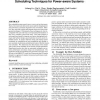Free Online Productivity Tools
i2Speak
i2Symbol
i2OCR
iTex2Img
iWeb2Print
iWeb2Shot
i2Type
iPdf2Split
iPdf2Merge
i2Bopomofo
i2Arabic
i2Style
i2Image
i2PDF
iLatex2Rtf
Sci2ools
118
Voted
CODES
2001
IEEE
2001
IEEE
A constraint-based application model and scheduling techniques for power-aware systems
New embedded systems must be power-aware, not just low-power. That is, they must track their power sources and the changingpower and performance constraints imposed by the environment. Moreover, they must fully explore and integrate many novel power management techniques. Unfortunately, these techniques are often incompatible with each other due to overspecialized formulations or they fail to consider system-wide issues. This paper proposes a new graph-basedmodel to integrate novel power management techniques and facilitate design-space exploration of power-aware embedded systems. It captures min/max timing and min/max power constraints on computation and non-computation tasks through a new constraint classificationand enablesderivation of flexible systemlevel schedules. We demonstrate the effectiveness of this model with a power-aware scheduler on real mission-critical applications. Experimental results show that our automated techniques can improve performance and reduce energy cost...
CODES 2001 | Embedded Systems | Min/max Power Constraints | Power Management Techniques | Software Engineering |
Related Content
| Added | 23 Aug 2010 |
| Updated | 23 Aug 2010 |
| Type | Conference |
| Year | 2001 |
| Where | CODES |
| Authors | Jinfeng Liu, Pai H. Chou, Nader Bagherzadeh, Fadi J. Kurdahi |
Comments (0)

